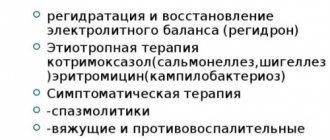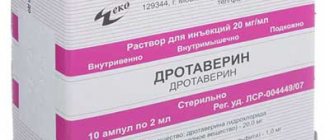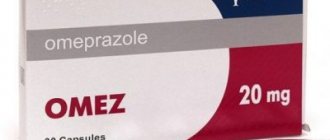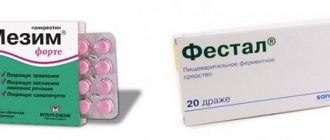Nausea is a painful, unpleasant sensation in the abdomen. Occurs in children and adults. It causes discomfort, leads to malaise, decreased physical activity, and may be accompanied by vomiting. This is a sign of a number of diseases and pathological processes occurring in the body. Anti-nausea pills will help you cope with poor health. These are called antiemetic drugs. To select the necessary medication, you first need to find out the cause of poor health.
When heaviness, bloating in the abdomen, and the urge to vomit occur, a person feels the following symptoms:
- Dizziness;
- Weakness;
- Stomach ache;
- Irritability may appear;
- Unpleasant taste in the mouth;
- Drowsiness;
- Intestinal upset, possible diarrhea;
- Rapid breathing and heart rate;
- Sweating;
- Increased salivation.
Severe nausea ends with vomiting. After this, a feeling of relief sets in, and the body’s condition returns to normal. If vomiting is excessive and uncontrollable, there may be a risk of dehydration and other complications.
Factors contributing to the feeling of abdominal discomfort:
- Digestive disorders (fatty, spicy foods, unhealthy diet, overeating);
- Infectious and viral pathogens (enterovirus infection, E. coli, staphylococci, etc.);
- Inflammatory processes of the gastrointestinal tract (cholecystitis, ulcerative colitis, gastritis, pancreatitis);
- Hypertension (increased blood pressure);
- Toxicosis (in the first trimester of pregnancy, a feeling of nausea and vomiting occurs due to hormonal changes in the woman’s body);
- Disruption of the central nervous system (constant stressful situations, psychological disorders, infectious diseases of the central nervous system);
- Congenital or acquired dysfunction of the vestibular apparatus (motion sickness, motion sickness);
- Side effects from the drug (occur due to individual intolerance to certain components of the drug);
- Poisoning, overdose;
- Malaise accompanied by vomiting can lead to complications such as dehydration. To eliminate the unpleasant symptom, it is important to find out what factors contribute to vomiting, the source of the disease, and begin appropriate treatment.
Anti-nausea pills
After conducting the diagnosis, determining the cause of the ailment, and making a diagnosis, the doctor prescribes a number of medications:
- Antiemetics;
- Astringents;
- Anti-inflammatory;
- Antibacterial;
- Antispasmodic;
- Antihistamines;
- Relieving pain.
The purpose of medications is to ease the feeling of nausea, resist pathological processes, restore stomach function, relieve spasms and pain, and cure concomitant diseases.
Medicines for nausea in diseases of the gastrointestinal tract
Disruption of the digestive system, infections, and inflammatory processes provoke vomiting. In this case, tablets are prescribed to stop vomiting and for diarrhea:
- Cerucal is an effective drug in the fight against nausea. Belongs to the group of antiemetics, is a stimulant of gastric motility. Indications for use: infection of the gastrointestinal tract, inflammatory reactions of the stomach, help get rid of nausea, vomiting, hiccups. The drug is available in tablet form and in liquid form for injection. Ampoules contain 2 ml of solution. For an adult, injections are prescribed by a doctor.
- Furazolidone is an antibacterial drug used for stomach diseases, including those of parasitic origin. Cheap tablets cope with vomiting and diarrhea.
- Sumamed (active substance – azithromycin). It is a broad-spectrum antibiotic. It is used in the treatment of infectious and inflammatory diseases. Eliminates pathogens, helps stop their growth and reproduction. The drug is available in the form of tablets, powder for suspension, and capsules.
- Xylocaine spray. It has an analgesic effect and eliminates the urge to vomit.
- Motilium. This antiemetic medicine helps eliminate symptoms of malaise, stomach pain, heartburn, and vomiting of various origins.
- Buscopan (active ingredient hyoscine butyl bromide). Has a local antispasmodic, choleretic effect. Good tablets, prescribed for the treatment of cholecystitis, biliary dyskinesia, renal colic, pylorospasm, ulcerative colitis.
- Riabal. It is an antispasmodic drug. Used in the treatment of gastritis (acute and exacerbation of the chronic form), stomach ulcers, relieves pain in cholecystitis, cystitis.
- No-spa (active ingredient drotaverine hydrochloride) is the best antispasmodic agent. Used to relieve spasms during inflammatory processes of the gallbladder and urinary system.
Drug treatment of nausea during pregnancy
During pregnancy, women experience toxicosis. The phenomenon is typical for the first trimester of pregnancy. Vomiting worries expectant mothers in the morning, after waking up. This is a natural reaction of the body to changes in hormonal levels. If you feel sick for a long time, you should seek medical help. The choice of medications during pregnancy must be taken seriously. The active substances of the drugs act on the entire body and can affect the fetus. Therefore, medications should be allowed during pregnancy. Treatment is prescribed only by a doctor. Self-medication is dangerous for both the woman and the child.
List of medications for pregnant women:
- Chophytol (active ingredient – artichoke extract). It is a choleretic and diuretic. Improves metabolic processes in the body.
- Bonin (active ingredient – meclozine). Helps with dizziness, vestibular disorders, motion sickness;
- Cocculin (active substance - cocculus indicus) is a homeopathic remedy. It is used for the treatment and prevention of nausea, motion sickness on the bus, on the plane.
Before use, carefully study the contraindications and side effects.
Anti-nausea and vomiting tablets for children
Vomiting in a child is dangerous due to rapid dehydration of the body. Therefore, it is necessary to prevent gagging and eliminate the cause, especially for children under one year old. Take medications only as prescribed by your pediatrician!
The following inexpensive medications are prescribed for children:
- Motilium (powder for suspension). The drug can be used from 0 years. Helps eliminate the child's feeling of discomfort in the stomach, heartburn, bloating, pain and cramps in the intestines. The suspension is used in the treatment of vomiting caused by poor diet, infections, and poisoning.
- Cerucal. Prescribed for pregnant women and children. It is an anti-vomiting remedy, reduces stomach cramps, and normalizes bile secretion. The drug in tablet form can be taken orally or injected. It does not help with nausea caused by dysfunction of the central nervous system if there is pathology of the vestibular apparatus.
- Atropine in tablet form and as a solution for injection. Stops gagging, reduces spasms of the digestive system. The injection is given to the child under the supervision of a doctor if necessary.
When vomiting, children need to drink rehydration medications (Regidron, Gidrovit) to restore fluids and minerals in the body. These medications should be given to the child after vomiting.
Treatment of nausea caused by vestibular disorders
A large number of people suffer from seasickness, motion sickness on planes and in cars. On the road, you can take mint drops for your stomach. It helps if you drink ginger tea and mineral water.
Medicines that help with such nausea include:
- Diazepam. The drug has sedative and anticonvulsant properties.
- Relanium (active ingredient – diazepam). The drug is prescribed for the treatment of muscle hypertonicity, convulsions and spasms, anxiety and excitement of the nervous system, epilepsy.
All iLive content is reviewed by medical experts to ensure it is as accurate and factual as possible.
We have strict sourcing guidelines and only link to reputable sites, academic research institutions and, where possible, proven medical studies. Please note that the numbers in parentheses ([1], [2], etc.) are clickable links to such studies.
If you believe that any of our content is inaccurate, out of date, or otherwise questionable, please select it and press Ctrl + Enter.
Why does this happen?
Nausea is not a pathology, but a symptom indicating the development of a pathological process. It can be a consequence of motion sickness on the bus, the result of a stressful situation or traumatic brain injury, etching and many gastrointestinal problems, pregnancy, etc. In this regard, lightheadedness is divided into:
- toxic - is a consequence of poisoning with poisons, food, endogenous intoxication;
- reflex – formed mainly as a result of the inflammatory process in the gastric mucosa after eating;
- cerebral - indicates ailments in the brain;
- vestibular - caused by malfunctions in the functioning of the corresponding apparatus, which is typical for pregnant women and menopausal age;
- metabolic – occurs against the background of errors in nutrition, due to fasting, diabetes, lack of vitamins, etc.
There are many reasons for nausea. Her attacks in this regard can be for various reasons, in particular:
Attacks of nausea are also accompanied by a number of ailments:
- gastritis and ulcers - mainly make themselves felt after eating and are accompanied by heartburn, burning and heaviness in the stomach;
- appendicitis - nausea is one of the symptoms of this disease. First, pain begins in the right half or center of the abdomen, then nausea. Body temperature also increases;
- meningitis - usually accompanied by lightheadedness, pressure in the back of the head, intolerance to light appears, temperature - up to 38C or more;
- migraine - together with severe throbbing pain in the head and slight dizziness, nausea is a constant sign of such an illness;
- hypothyroidism - nausea along with weakness, desire to sleep and inability to eat, weight gain and the appearance of puffiness on the face are the main symptoms of this disease;
- pathologies of the gallbladder (including cholelithiasis) - nausea, along with the symptoms characteristic of these ailments (bitter taste in the mouth, distension in the epigastric region, pain in the hypochondrium on the right side) always accompanies problems with this organ;
- pancreatitis - this disease is also determined by the signs induced above, only in addition – and weight loss;
- hypertension - with it, nausea occurs in the morning, although in a milder form it can make itself felt during the day. In addition, patients with this pathology constantly feel a rush of blood to the face, dizziness, and swelling;
- stroke - characteristic symptoms of this pathology include foggy consciousness, lightheadedness with dizziness, severe pain in the back of the head;
- inflammation of the kidneys - obvious signs of illness include chills, nausea, pain in the abdomen and lower back, high fever;
- oncological illnesses - the patient feels unwell when the disease is still developing, then nausea accompanies chemotherapy used in tumor therapy.
Nausea and vomiting are extremely unpleasant manifestations of food poisoning, intestinal infections and many other diseases. As a rule, they appear together: first, a dull wave rolls up to the throat, and then the urge to vomit begins. In this situation, you need to know how to stop vomiting by choosing effective pills.
Indications for use
Anti-vomiting pills are usually taken if it occurs after eating too much food, too much emotional stress or a stressful situation, taking certain medications (for example, cytostatics) for sea or air sickness, after radiation therapy or surgery. Before using any antiemetic, you need to pay attention that all drugs in this group have a different mechanism of action. That is, if you need to get rid of vomiting after overeating, you should take one pill, and for air sickness, another.
That is why, before using anti-vomiting pills, you need to determine the cause of its occurrence. If you cannot stop the unpleasant symptom, you should immediately call an ambulance.
Pharmacodynamics and pharmacokinetics
Let's consider the pharmacodynamics of anti-vomiting tablets using the example of the popular drug "Cerucal".
As an effective antiemetic drug, Cerucal helps block serotonin and dopamine receptors. The main substance metoclopramide has peripheral and central effects. Thanks to the blockade of dopamine receptors in brain cells, the threshold of irritation of the center, which is responsible for the gag reflex, increases.
Thanks to its mechanism of action, Cerucal helps to quickly cope not only with vomiting and nausea, but also with hiccups. The action consists of reducing the motor activity of the esophagus, increasing the tone of the lower sphincter, rapid evacuation of the stomach, accelerating the movement of food through the small intestine without signs of diarrhea and normalizing the biliary function of the liver.
Let's look at the pharmacokinetics of anti-vomiting tablets using the popular drug "Cerucal" as an example.
The tablets are absorbed quite quickly immediately after they are ingested. Their bioavailability is up to 80%. Metabolism occurs in the liver. Half-life is eliminated within 3-5 hours. For chronic kidney disease, this process can take up to 14 hours. The drug is excreted unchanged through the kidneys within 1 day.
Types of antiemetic drugs
The gag reflex is caused by neurotransmitters - dopamine, acetylcholine, histamine, serotonin, endogenous opiates, substance P, gamma-aminobutyric acid. In case of poisoning, an antiemetic contains antagonists to these substances, which creates the desired therapeutic effect. For example, a large group of gastrokinetics eliminates nausea caused by impaired intestinal motility, increased tone of the esophageal sphincter, and heartburn. The category includes Metoclopramide, Bromoprid, Perinorm, Motilium, Raglan, Riabal.
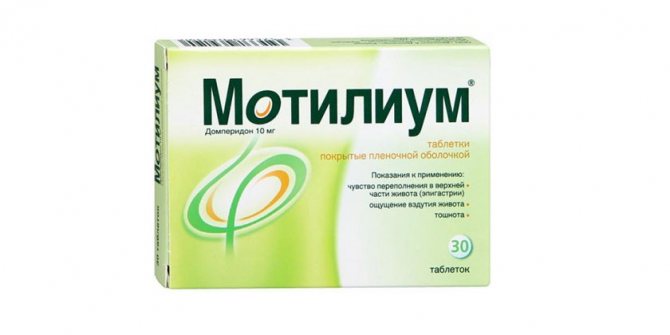
Serotonin receptor antagonists
Anti-vomiting tablets based on serotonin antagonists block receptors for this hormone and suppress attacks of nausea. The drugs contain the substances ondansetron, tropisetron, tropindole, which help with conditions after chemotherapy and radiation therapy. Their use helps to increase the dose of cytostatics. For a complex effect on dopamine and serotonin receptors, metoclopramide is used (part of the drugs Reglan, Cerucal), which suppresses both types.
The substance copes with vomiting caused by anesthesia, antibiotics, and digitalis extracts. The component effectively helps with dyspepsia in severe cardiac patients. Anti-vomiting medications:
- Ondansetron - tablets and solution to eliminate vomiting. Contains the active substance of the same name, which suppresses serotonin receptors. Contraindications are children under two years of age, hypersensitivity. Take 8 mg every 12 hours for 1–5 days. Cost – 325 rubles.
- Kytril is a granisetron-based tablet that eliminates vomiting and nausea after chemotherapy, radiation, and surgery. Contraindicated during lactation. Prescribed 1 mg twice a day or 2 mg once. Cost – 4689 rub.
- Notirol - tablets containing granisetron hydrochloride. An antiemetic eliminates dyspepsia after radiation therapy; it is contraindicated during breastfeeding. The use of 1 mg twice a day is indicated for no more than a week in a row. Price – 3120 rubles.
Dopamine antagonists
Antiemetic dopamine antagonist drugs include those that block receptors located on the cell membrane of neurons in the trigger zone of the vomiting center of the brain ventricle. They affect smooth muscles and have many side effects - from bleeding, epileptic seizures and drowsiness to allergies, weakness and paralysis. The composition of the products includes domperidone, chlorpromazine, aminazine, haloperidol, torecan. Popular drugs in this group are:
- Cerucal is a tablet and parenteral solution based on metoclopramide hydrochloride monohydrate, which has anti-hiccup and antiemetic effects. Contraindicated for digestive disorders, epilepsy, prolactin-dependent tumors, pheochromocytoma, first trimester of pregnancy, lactation, and under two years of age. Tablets are taken 10 mg 3-4 times a day for a course of 1-6 months. Price – 120 rub.
- Domperidone is a tablet based on the antiemetic substance of the same name, which blocks central dopamine receptors. The drug is contraindicated in case of intestinal obstruction, age under one year, prolactinoma. Use 1-2 tablets 3-4 times a day for a course of 4 weeks. Price – 188 rubles.
- Motilium is a suspension and lingual lozenges based on domperidone. Contraindicated in children with hypersensitivity to the components. You can take 10 mg three times a day. The course of treatment lasts until the symptoms disappear. Price – 150 rub.
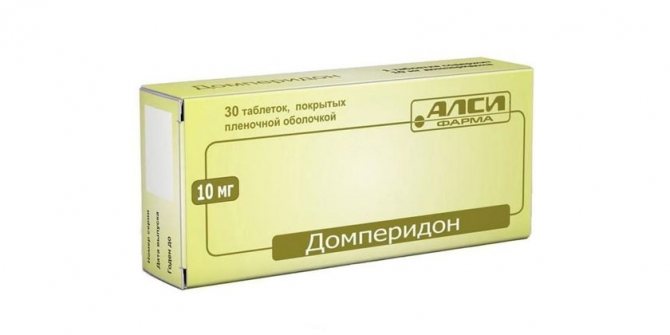
Histamine receptor antagonists
Tablets for the gag reflex, which occurs when the vestibular apparatus is disrupted, should contain non-selective histamine receptor blockers. They include diphenhydramine, promethazine, diprazine, aeron, meclozine, bonine, pipolfen. Popular drugs of the group are:
- Diphenhydramine - tablets with antiemetic, sedative and hypnotic effects based on diphenhydramine. Contraindicated for glaucoma, prostatic hyperplasia, bladder stenosis, epilepsy, bronchial asthma. 30–50 mg of the drug 1–3 times a day helps with vomiting. The course of treatment can last 7–15 days. Cost – 128 rubles.
- Pipolfen is a promethazine-based solution that blocks the activity of histamine receptors. Contraindicated for glaucoma, alcohol intoxication, age under 2 years, lactation, pregnancy. A maximum of 150 mg can be administered intravenously per day. Cost – 1036 rub.
- Diprazine – contains the component of the same name with an antiemetic effect. Available in dragee, tablet and solution formats. Contraindications: lactation, age up to 3 months. The prescribed dose is 75-100 mg per day in 3-4 doses. Cost – 219 rubles.
Anticholinergic
Anticholinergic drugs have a central effect against vomiting, which increase the tone of the lower esophageal sphincter and prevent the stomach from emptying in the form of nausea. Such products contain atropine, metacin, glycopyrronium bromide, methscopolamine, propantheline bromide, isopropamide, aminopeptamide. Such medications can cause dry mouth, tachycardia, and urinary retention.
Another effect of anticholinergic drugs is to suppress the activity of muscarinic receptors in the centers of the brain located above the brainstem. They include butylscopolamine, hyoscine, metamizole, dipyrone. Group drugs:
Vomiting and nausea are not independent diseases, but symptoms of a developing disorder. It may be associated with poisoning of the body with toxic substances, improper functioning of the gastrointestinal tract and other reasons. If such symptoms occur once and can be quickly eliminated, undergoing a medical examination is optional. If the patient’s condition does not worsen, he may not contact specialists, but simply maintain a healthy lifestyle and proper diet. But with constant nausea and developing vomiting, we can talk about pathological and dangerous processes for the patient. In this case, self-medication is undesirable and it is better to consult a doctor who can prescribe anti-vomiting medications, taking into account the patient’s condition.
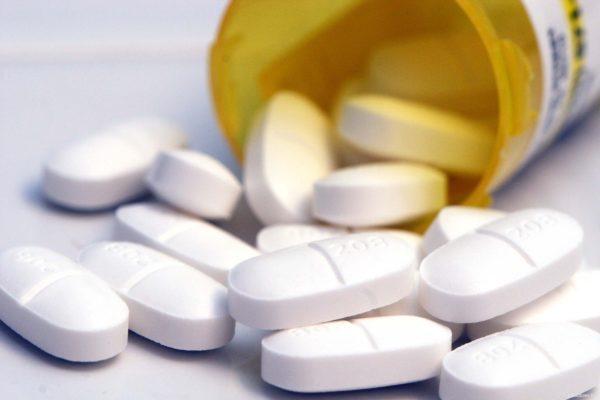
Medicines for vomiting and nausea
Using anti-vomiting tablets during pregnancy
During pregnancy, especially in the first weeks, nausea and vomiting are constant companions of a woman. Of course, they need to be treated. Today, pharmacies offer many different products that help cope with such an unpleasant condition, even during pregnancy.
For example, “Hofitol” is a fairly popular tablet for vomiting and nausea. It contains artichoke leaves and cynarin. But it also has contraindications: cholelithiasis, kidney and liver diseases, intolerance to components. Take Holifol 2-3 tablets three times a day.
Anesthesin is considered an equally popular remedy. This drug can be used not only during pregnancy, but also to treat vomiting in children.
Prokinetics
Injections, suspensions and tablets for nausea and vomiting of this group activate the motility of the digestive tract. The tablets increase the tone of smooth muscles, which is the reason for the disappearance of discomfort.
The antiemetic effect of the drug is explained by its effect on dopamine and serotonin receptors, a decrease in the sensitivity of visceral cells and an improvement in motility of the upper gastrointestinal tract. The use of anti-vomiting tablets leads to the restoration of the normal amount of bile secreted, reducing the time of evacuation of stomach contents into the duodenum.
Cerucal is available in the form of powder tablets for the preparation of an injection solution. It is indicated for the following conditions:
- irritable bowel syndrome;
- functional pyloric stenosis;
- gastric paresis caused by the consequences of diabetes mellitus;
- nausea and vomiting of various origins.
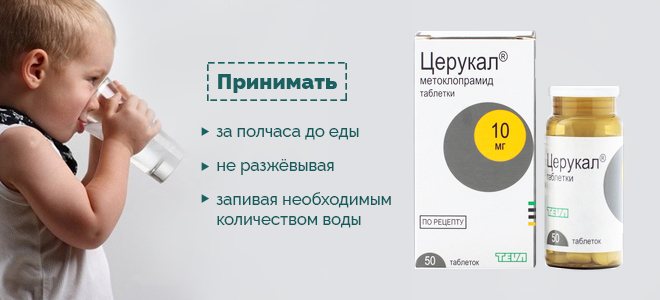
Tablets for vomiting and nausea are prescribed to adult patients and children over three years of age. Adults and teenagers can drink 10 g three times a day. A child under 12 years of age is given anti-vomiting tablets at the rate of 0.1 mg per 1 kg of weight.
Cerucal is not prescribed during pregnancy, intestinal obstruction, bronchial asthma and intestinal perforation. Contraindications also include epilepsy and individual intolerance.
If you are wondering how to get rid of vomiting and nausea caused by overeating, stress or indigestion, use Motilium. The tablets are sold in pharmacies without a prescription. The drug restores normal gastric motility, suppresses the activity of nerve receptors, eliminating dyspeptic symptoms:
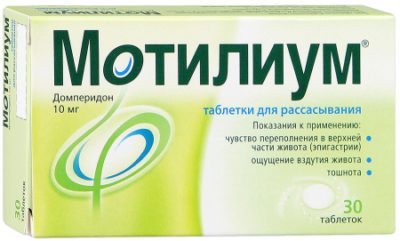
- hiccups;
- loss of appetite;
- heartburn;
- bloating;
- burping;
- gagging and nausea;
- heaviness and feeling of entanglement.
Anti-vomiting tablets can be used during pregnancy and lactation if the possible risks for the mother exceed the consequences of using the drug for the child. It is forbidden to use the medication for gastrointestinal bleeding, perforation, hyperprolactinemia.
Motilium is prescribed to children over 5 years of age and adults. To eliminate dyspeptic symptoms, a dosage of 10 mg 3 times a day is used. For severe nausea and vomiting, you can take a double dose of tablets.
Contraindications for use and side effects
The main contraindications to the use of anti-vomiting tablets are the following:
- Intolerance to their main components.
- Pregnancy and breastfeeding.
- Children's age (rare).
- Chronic liver and kidney diseases.
- Bleeding of the gastrointestinal localization.
- Peptic ulcer of the stomach and duodenum and ulcerative colitis.
Of course, like other medications, anti-vomiting tablets have their side effects. The most common are:
- Allergies (rash, hives, itching).
- Irritation, drowsiness, insomnia.
- Dryness and unpleasant taste in the mouth.
- Agranulocytosis.
- Diarrhea or constipation.
If you notice side effects, you should immediately consult a doctor.
[10], [11], [12], [13], [14], [15], [16], [17], [18]
Vomiting at different stages of poisoning
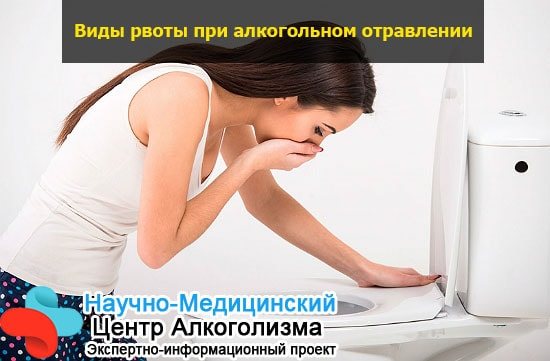
With a hangover and during intoxication with alcoholic beverages, vomits bile in different ways (depending on the degree of the pathological condition). Before starting treatment, you need to determine the type of poisoning. There are five of them in total.
When the escaping masses contain particles of alcohol and remnants of what you ate, there is no cause for alarm. The body independently tries to eliminate toxins from the gastrointestinal tract. After such vomiting, the patient feels relief.
To speed up the removal of acetaldehyde, you need to drink more liquid.
If a person begins to choke or cough, this indicates an allergy to alcohol. Also, with this pathological condition, the skin changes color.
When masses of a yellowish-green hue are observed, a bitter taste appears in the mouth, this indicates that the patient is vomiting bile. This type of intoxication is more serious. In certain situations, hospitalization may even be necessary.
Vomiting of a yellowish-green color and bitterness indicates disorders in the biliary tract. A person may have inflammation of the pancreas (pancreatitis). The hospital must rinse the gastrointestinal tract.
When blood clots are observed in the vomit, this poses a great danger. You should contact a medical facility for help immediately. Otherwise, you can expect sad consequences. Such vomiting indicates the likelihood of hemorrhage in the esophagus.
The most dangerous are the black masses. They can lead to the death of the patient. Such vomiting indicates bleeding in one of the organs.
In this case, the patient is placed in the intensive care unit.
Names of anti-vomiting tablets
Metherazine. The drug is quite potent. It is often used to relieve vomiting and nausea caused by motion sickness. The active ingredient is prochlorperazine.
Use one tablet after meals three to four times a day. If after the first use all symptoms have disappeared, there is no need to reuse the drug.
The main side effects from the use of Meterazine are: drowsiness, dysmenorrhea, dry mouth, loss of appetite, allergies, swelling, agitation. These anti-vomiting tablets are contraindicated for: heart and vascular diseases, brain injuries, pregnancy and breastfeeding, breast cancer, glaucoma (especially angle-closure), epilepsy, old age, intolerance to components.
Aeron. Tablets that are used to prevent motion sickness and relieve symptoms such as vomiting. The active ingredients are: hyoscyamine and scopolamine.
The drug should be taken thirty minutes before a flight or trip on another type of transport. Take two tablets on an empty stomach. After one hour, you need to take another tablet. Sometimes Aeron is prescribed to reduce vomiting when the patient has a headache. It is not recommended to exceed the maximum dosage allowed for one day (four tablets).
This anti-vomiting remedy is not prescribed to patients with angle-closure glaucoma, chronic prostate diseases or intolerance to their components. Sometimes unpleasant side effects occur: thirst, dilated pupils, urinary retention, dizziness, accommodation paresis.
Diprazine. It is a popular sedative and antihistamine. Due to its calming effect on the central nervous system, it helps stop vomiting.
The drug is taken twice or three times a day (one tablet at a time) after eating. Very rarely, side effects occur after use: dry mouth, skin irritation, decreased blood pressure, drowsiness.
The product is completely contraindicated to be taken with alcohol. Also, vehicle drivers should not use the tablets. During pregnancy, you can take it after a doctor's prescription.
Cerucal
A popular antiemetic drug that helps block dopamine receptors. The active component of these tablets is considered to be metoclopramide hydrochloride monohydrate.
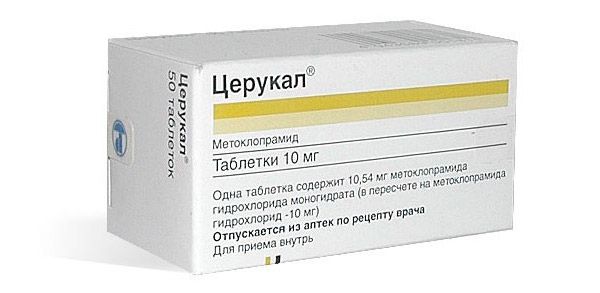
Take half an hour before eating. You should take the drug with a sufficient amount of water. Adults are recommended to take one tablet 3-4 times a day. Children can usually take half a tablet two to three times a day.
Cerucal is contraindicated at the beginning of pregnancy, in women who are breastfeeding, or with intolerance to its components. Common side effects from using the drug are: dizziness, migraines and headaches, severe fatigue, deterioration of emotional state, drowsiness, tinnitus, agranulocytosis, diarrhea, constipation.
[19], [20], [21], [22], [23]
Metoclopramide
An inexpensive and effective remedy for relieving severe vomiting, nausea and hiccups. Helps stimulate gastric peristalsis. Blocks dopamine receptors. The active ingredient is: metoclopramide hydrochloride monohydrate.
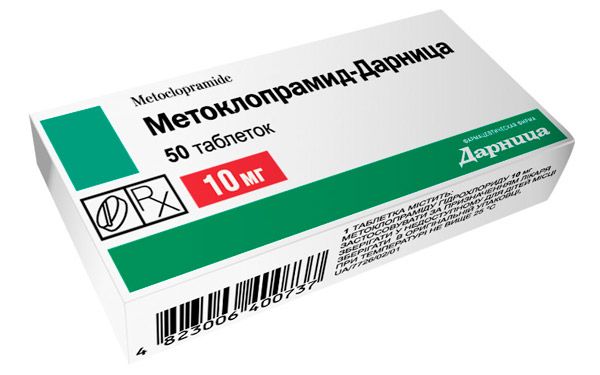
The average dosage of these anti-vomiting tablets is 1 tablet three to four times a day. If vomiting is very severe, the dose can be increased to 2 tablets.
Metoclopramide should not be used by pregnant women or while breastfeeding. Contraindications also include: bleeding in the gastrointestinal tract, intestinal obstruction, epilepsy, intolerance to the components of the drug. Side effects from use are the following: diarrhea or constipation at the very beginning of therapy, drowsiness, severe fatigue, headache and migraine, akatasia, agranulocytosis, allergies.
Preparations of the nitrofuran group
These medications are used for diseases of the gastrointestinal tract, intestinal and toxic infections. They suppress the growth of pathogens, destroy pathogenic microorganisms, bind and remove toxic products of their vital activity.
Medicine for nausea and vomiting is an antimicrobial drug, but is not an antibiotic. It suppresses the activity of most types of pathogens of intestinal infections, therefore it is recommended in the presence of symptoms of acute intestinal infections - diarrhea, nausea, vomiting, fever, dizziness and weakness. The product is used after consultation with a doctor, as a prevention of dehydration.
It is recommended that children from one to seven years old be given an anti-vomiting drug in the form of a suspension, 100–200 mg three times a day. The dosage is calculated taking into account the age of the child. Adults and children over 7 years of age are prescribed 200 mg of the drug in capsules, 4 times a day.
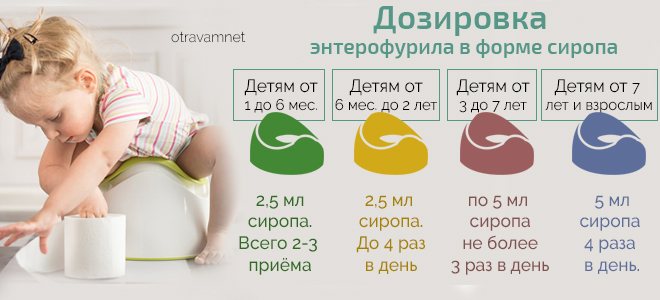
The list of contraindications includes children under one month of age and individual intolerance to the components. Can be used during pregnancy with a doctor's permission.
Antimicrobial agent based on nifuroxazide. Available in the form of tablets and suspensions for the treatment of gastrointestinal infections accompanied by diarrhea, nausea, vomiting and other specific symptoms.
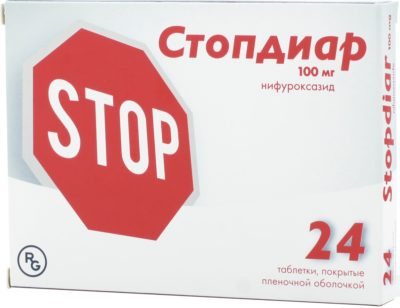
Stopdiar tablets are contraindicated for the treatment of children under seven years of age, as well as for those with individual intolerance to nifuroxazide. During the period of bearing a child and breastfeeding, the use of the product is possible according to the doctor’s decision.
The drug is taken 2 tablets 4 times a day with a small amount of liquid. At least 6 hours should pass between doses.
Tablets for vomiting and nausea
Activated carbon. An excellent absorbent that helps cope with nausea and vomiting caused by overeating or taking medications.
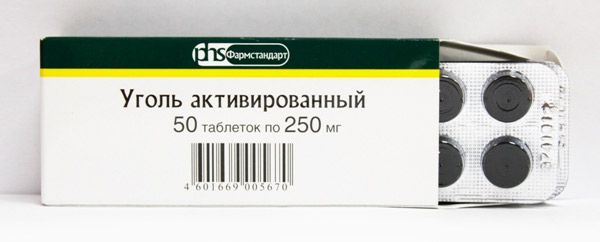
The dosage depends on the patient's weight. Usually take up to 750 mg of activated carbon 3-4 times a day. The main side effects include: diarrhea, constipation, hypovitaminosis (with long-term use). Activated charcoal should not be used for bleeding in the stomach, or for patients with ulcers.
Kokkulin. This is a homeopathic medicine. The active ingredients are: cocculus indicus, tabacum, nux vomica, petroleum. The tablets must be dissolved in the mouth. Helps cope with nausea and vomiting during motion sickness.
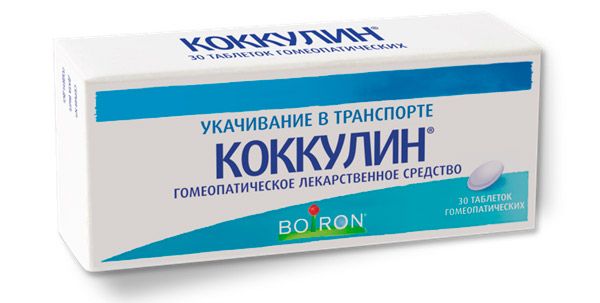
Take two tablets three times a day 24 hours before your intended trip and on the same day. To treat vomiting that was not caused by motion sickness, dissolve two tablets until the normal state is completely restored (every hour).
Side effects: allergic reactions. Do not take if you are intolerant to the components of the drug or during lactase deficiency.
Serotonin receptor antagonists
They block the transmission of nerve impulses in the parts of the brain responsible for the gag reflex. Medicines are used for severe nausea and vomiting caused by chemotherapy or other strong factors.
The drug blocks the gag reflex caused by taking chemotherapeutic anticancer drugs for 24 hours. Unlike analogues, it does not lead to kinetic disorders - hand tremors, loss of coordination. Due to the high activity of the anti-vomiting drug, it can be taken only once a day.
The drug is available in the form of capsules and solution for injection in ampoules. It is used in courses of 6 days. On the first day of the course, Tropisetron is administered intravenously using a dropper, and capsules are prescribed for the next 5 days.
Daily dose – 5 mg. Contraindications include pregnancy and individual intolerance to the components.
Tablets for vomiting and diarrhea
Polyphepan. This drug is of plant origin. It is derived from hydrolytic lignin. It has a detoxifying, enterosorbing, hypolipidemic, and antidiarrheal effect.
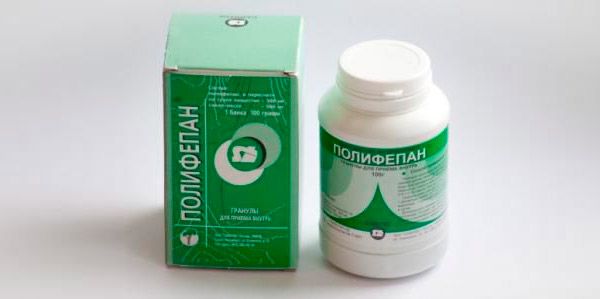
The tablets are taken an hour or an hour and a half before meals. The maximum daily dose for adults is up to 16 tablets (for children - 10 tablets). Therapy lasts no more than 7 days for acute diseases.
The main side effects are allergies and constipation. The drug should be taken with caution in patients with diabetes. It is contraindicated in case of intolerance to the main components.
Motilium. An excellent antiemetic that also helps relieve nausea and diarrhea. The main active ingredient is domperidone.

The average dosage is considered to be: 1-2 tablets 3-4 times a day. Contraindications for taking the drug are the following diseases: bleeding in the stomach, benign and malignant pituitary tumors, acute and chronic kidney and liver failure, intolerance to components, too low body weight (up to 35 kg), pregnancy, lactation.
Side effects include: intestinal spasms, agitation, convulsions, anaphylactic reactions, allergies, drowsiness.
List of the best antiemetics for adults
Today, the pharmaceutical industry offers patients drugs from different groups with different properties. They are used depending on the accompanying symptoms.
| Funds group | Peculiarities |
| Serotonin receptor antagonists | Drugs in this group do not suppress the production of serotonin, which helps transmit a signal to the brain and provokes vomiting, but they do eliminate its effect in the form of the gag reflex. As a result, a natural process of preventing vomiting occurs without significantly affecting the concentration of serotonin in the blood. Medicines are considered effective and are used for dyspepsia of various origins. |
| Histamine receptor blockers | These medications are usually used as anti-allergy medications. However, they suppress the processes in the brain responsible for the gag reflex. Only 1st generation medications that can affect the central nervous system are suitable for this. |
| Anticholinergics | These medications not only suppress the gag reflex by blocking the interaction of several receptors, but also help eliminate spasm of the muscle fibers of the digestive system. Additionally, the medications have hypnotic properties, which also helps prevent the re-development of the gag reflex. |
| Dopamine antagonists | Dopamine is a neurotransmitter that, when interacting with trigger zones, provokes vomiting. Dopamine antagonists help block the receptors that trigger its increased production. As a result, the gag reflex is suppressed. |
Additionally, there are groups of products of natural origin.
It is recommended to use antiemetic medications after consulting a doctor. The product for adults and children is selected individually, taking into account associated deviations.
Cerucal
The most popular medication from the group of serotonin receptor antagonists. The composition contains the substance metoclopramide, which has a therapeutic effect. It is recommended to take 1 tablet 2-3 times a day for 7-10 days. The injection solution is administered 2 ml 2 times a day intramuscularly for 10 days.
The drug is not used if you are allergic to its components, during pregnancy and lactation. It is not prescribed to children under 1 year of age or to patients with epilepsy. Children are not allowed to use the medication for more than 2 days.
Raglan
Another drug based on metoclopramide, related to serotonin receptor antagonists. Available in oral tablet form and as a solution for intramuscular or intravenous administration. The solution should be administered no more than 2 times a day, 2 ml. The duration of treatment is 3-5 days, depending on the severity of symptoms.
It is recommended to take 1 tablet 3 times a day for 7 days. It is better to take the tablets before meals to suppress the gag reflex.
It is strictly contraindicated to use the medicine in the following cases:
- Internal bleeding due to stomach and intestinal ulcers.
- The period of bearing a child and breastfeeding.
- Dyskinesia of the muscles of the digestive tract.
- Suspicion of perforation of the wall of the stomach or intestines.
- Individual intolerance to the components of the composition.
If it is necessary to use the medicine during the lactation period, feeding should be stopped. The medicine is also not used for nausea associated with an overdose of antipsychotics.
Motilium
A drug based on domperidone, which has a pronounced antiemetic effect by activating gastric and intestinal motility. Available in tablet form and as an oral suspension. Adults take 1 tablet 3 times a day for 1-2 weeks. Children are prescribed a suspension in the amount of 2.5 ml for every 10 kg of body weight.
The duration of use of the suspension is 5-10 days, depending on the severity of symptoms. You should not use the medicine if you are intolerant to its components, have internal bleeding or perforation of the stomach wall. It is not prescribed for severe pathologies of the heart and liver.
Buscopan
An antiemetic for adults based on geoscine butyl bromide has antispasmodic properties, so it helps eliminate nausea and vomiting associated with spasms of the muscles of the stomach and intestines.
Tablets should be taken orally, 1 piece 3 times a day for 7 days. The product is contraindicated for children under 6 years of age, pregnant and lactating women. It is not used for the treatment of patients with angle-closure glaucoma, as well as intolerance to the components of the composition.
Riabal
Product containing prifinium bromide. It has an antispasmodic and pronounced antiemetic effect by blocking m-cholinergic receptors. The drug is available in the form of a solution and tablets for oral administration.
The solution is most often administered intramuscularly no more than 2 times a day, 2 ml. Tablets should be taken orally, 1 piece 2-3 times a day. The duration of treatment is 5-10 days depending on the severity of symptoms. You should not use the medicine if you are allergic to its components, during lactation or pregnancy. Riabal is not prescribed for severe liver and kidney damage.
Enterofuril
A product based on nifuroxazide. Which has an antiseptic, anti-inflammatory, antidiarrheal effect. Additionally, the medicine improves motor skills, eliminates nausea and vomiting associated with poisoning, as well as the entry of viruses and bacteria into the body.
The suspension is prescribed to children older than 1 month, 5-20 ml per day, depending on age. Capsules are indicated for children from 3 years of age and adults. It is recommended to take 3 capsules per day for 5-7 days.
The drug is not prescribed for allergies to its components, during the lactation period and during pregnancy.
Metoclopramide
An antiemetic medication containing the active ingredient of the same name. Helps suppress the gag reflex and eliminate nausea. The solution is administered to patients intramuscularly or intravenously from 2 to 6 ml per day. Take 1 tablet orally 3 times a day. The duration of the course should not exceed 10 days.
Contraindications for use are allergies to the composition of the drug, epilepsy, bleeding from the stomach or intestines. The drug is not prescribed for pyloric stenosis, glaucoma and suspected perforation of the wall of the digestive tract. The product is not used to treat children under 14 years of age.
Stopdiar
A drug based on nifuroxazide, which has an antidiarrheal and antiseptic effect. By destroying microbes, it helps eliminate nausea and vomiting associated with poisoning by their waste products.
Children and adults are recommended to take the suspension. The daily norm is 10-20 ml, depending on age and severity of symptoms. The duration of treatment should not exceed 7 days. The drug is not prescribed if you are allergic to its components, or during pregnancy.
Tropisetron
An antiemetic drug based on the active ingredient of the same name. Quickly eliminates the symptom and improves the patient's condition. Take 3 capsules per day for 2-4 days. The solution is administered intravenously at 5 ml per day. Course duration is from 3 to 5 days.
The drug is contraindicated in children under 2 years of age, pregnant and lactating women, as well as patients with allergies to its components.
Motinorm
Domperidone-based antiemetic for adults helps quickly relieve nausea, vomiting and hiccups. Take 2 tablets 3 times a day for 4-6 days. The medication is not used for intestinal obstruction, pregnancy and the lactation period. It is also not prescribed to patients under 12 years of age.
Passazhiks
Another antiemetic drug containing domperidone. Used to eliminate vomiting and nausea of various origins. Tablets should be taken 1 piece 3 times a day.
Contraindications for use:
- Allergy to components.
- Age up to 5 years.
- Lactation and pregnancy period.
- Perforation of the wall of the stomach or intestines.
- Internal bleeding in pathologies of the digestive tract.
- Pituitary tumors.
The maximum duration of the course is 7 days.
Validol-N
A drug that contains a menthol solution in an unusual form. As a rule, the medicine is used as a sedative for angina and tachycardia, but its properties can be used to eliminate nausea and vomiting caused by motion sickness in transport.
When symptoms appear, 1 tablet of the medicine should be dissolved. You can repeat after 2 hours. The drug is not used in courses, but is used as symptomatic therapy. The maximum number of tablets per day is 6. The drug is contraindicated during pregnancy and lactation, in case of intolerance to its components and persistent hypotension.
But-spasm
Preparation based on prifinium bromide. It has a pronounced antiemetic effect, eliminates nausea caused by spasm of the digestive tract. The oral solution should be taken 3 times a day, 1 ml. The maximum duration of the course is 5 days.
The drug is contraindicated in the following cases:
- Thyrotoxicosis.
- Lactation and pregnancy period.
- Age up to 14 years.
- Severe form of hypotension.
- Vascular pathologies.
- Epilepsy.
- Severe bradycardia.
Do not use the medicine if you are allergic to its components.

A medicine with scopolamine and geoscyamine as active ingredients. It has a pronounced antiemetic effect and is considered safe for the patient. Tablets should be taken 2 pieces 2 times a day for 5-7 days. The medicine is contraindicated in case of intolerance to its components, prostate hyperplasia, glaucoma.
Dimenhydrinate
A medicine based on the active substance of the same name. It has antihistamine and antiemetic properties, so it quickly eliminates nausea and vomiting of various origins.
The recommended dose is 1 tablet 3 times a day. Course use is not practiced; the medicine is used only when symptoms appear. The drug is contraindicated during pregnancy and lactation, under the age of 2 years, allergies to components.
Ciel-Teva
A product based on dimenhydrinate. Used to eliminate vomiting and nausea caused by motion sickness in transport. It has additional antihistamine properties, that is, it blocks receptors that cause the release of histamines into the blood.
Anti-vomiting tablets
Betahistine. The active ingredient of the drug is betahistine dihydrochloride. Usually this drug helps to cope with severe vomiting that was caused by motion sickness. To get an effective result, you need to take half a tablet 3 times a day a few days before your intended trip.
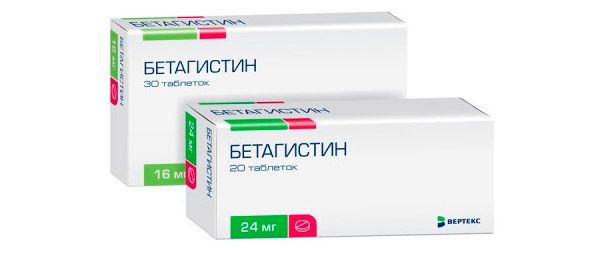
The drug is contraindicated in: pregnancy, breastfeeding, under the age of 18 years. Side effects from taking the drug may be: stool upset, allergic reactions.
Buskopan. The active ingredient in these anti-vomiting tablets is hyoscine butyl bromide. This drug is used to treat severe vomiting and nausea in gastrointestinal diseases.
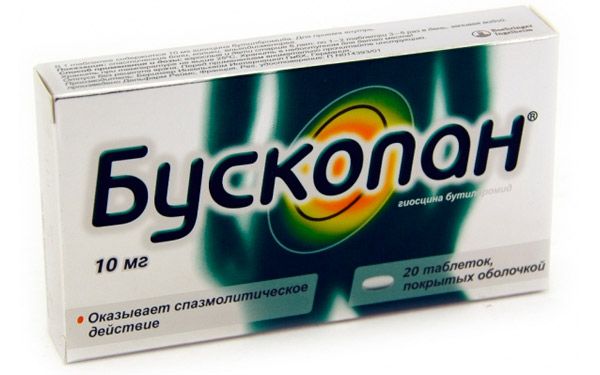
The product should be taken three times a day, 1 tablet. The main side effects of the drug are: urinary retention, allergies, tachycardia, difficulty breathing. Buscopan is contraindicated in children under 6 years of age, during pregnancy and breastfeeding, and in patients with myasthenia gravis and megacolon.
Combined products
Medicines in this group are appropriate when the cause of nausea or vomiting is not established. They have several properties - antiemetic, anti-inflammatory, antibacterial. Sometimes a single use of such a drug is enough to completely eliminate nausea and vomiting.
Eliminates spastic pain, nausea and vomiting, relaxes smooth muscles, suppresses inflammatory processes in the stomach and intestines. They consist of paracetamol, NSAIDs and an anticholinergic agent. Prescribed for renal, intestinal, and stomach colic of moderate intensity, 1 tablet three times a day.
The drug is not used in pediatrics and is strictly prohibited during pregnancy. Contraindications also include internal bleeding, peptic ulcers, glaucoma, and chronic alcohol dependence.
Anti-vomiting tablets for children
Anestezin. The active ingredient of the drug is benzocaine. The main feature of this remedy is the fact that it can be taken even by small children to eliminate vomiting and nausea. The dosage is individual. It depends on the severity of the disease that caused the unpleasant symptom, as well as on the indications.

The main side effects from using this drug are allergic reactions. The product should not be taken if you are intolerant to its components.
Storage conditions and shelf life
It is recommended to store anti-vomiting tablets in a dry place away from direct sunlight. The air temperature should not exceed +30 degrees. It is very important to keep away from children. Additional information about storage conditions can be found in the instructions for the drug.
As a rule, the shelf life of such tablets does not exceed five years. Please note that taking anti-vomiting tablets after this period is not recommended, as this may lead to complications.
Medicine for nausea is used not only to eliminate this symptom of numerous diseases, but also to prevent it. A feeling of discomfort appears in the epigastric region and then spreads to the esophagus. The cause of the development of nausea and vomiting is the vagus and splanchnic nerves. It is their irritation that provokes excessive salivation, chills, arrhythmia, arterial hypotension, and dizziness. These negative signs of deterioration in health almost always accompany nausea. Before taking the pill, you need to determine the cause of the pathological symptom.
How to choose the right drug
If nausea has become a constant companion of a person, then pathology develops in his body. Only after its elimination will the discomfort in the stomach disappear. Diseases of the digestive tract are a common cause of nausea and vomiting. Therefore, treatment of patients begins with taking tablets and suspensions:
- antacids (Maalox, Rennie, Gastal);
- proton pump inhibitors (Rabeprazole, Pantoprazole, Omez);
- drugs with digestive enzymes (Enzistal, Festal, Mezim forte).
Patients who have been diagnosed with chronic poisoning by heavy metals, caustic alkalis and acids often complain of painful nausea. In this case, detoxification therapy is carried out to remove toxic compounds from the body. Doctors use enterosorbents, diuretics, and saline solutions with glucose.
Recommendation: “If the cause of nausea is simply overeating or eating fatty foods, then it is advisable to take tablets with digestive enzymes.”
In people who are emotional, easily excitable, and have a hard time even with an ordinary everyday conflict, nausea is of neurogenic origin. The strongest pills will be useless here - the factor provoking the discomfort should be eliminated. Nausea will disappear after taking sedatives and sedatives:
- tinctures of St. John's wort, motherwort, valerian;
- Tenotena, Deprima, Persena.
You can quickly and effectively get rid of nausea with the help of antiemetics - Cerucal and its structural analogue Metoclopramide. But doctors prefer not to prescribe them without compelling reasons, which include:
- a state of dehydration that threatens human life;
- malignant neoplasms;
- poisoning;
- certain pathologies of the gastrointestinal tract.
Taking Cerucal without the knowledge of the doctor can seriously aggravate the situation. The fact is that this antiemetic in case of poisoning has numerous contraindications and side effects. When pathogenic microorganisms multiply in the stomach, symptoms that are unpleasant for humans perform a protective function. Along with vomit, harmful bacteria, viruses, and protozoa are also eliminated. Potent tablets will stop nausea, which will provide a favorable environment for the rapid growth of infectious pathogens.
Why does vomiting occur during poisoning?
Vomiting and nausea are protective mechanisms in the human body.
The toxin that enters the gastric cavity irritates the mucous membrane and contributes to the development of a local inflammatory process. The stomach reflexively tries to get rid of the dangerous substance. First, the person feels nauseous, and then vomits. Such vomiting helps to reduce intoxication syndrome and remove toxins from the stomach that did not have time to enter the bloodstream. Vomit may contain food, drink, mucus, bile and stomach acid. After such emptying of the gastric cavity, the patient's condition improves significantly.
In case of poisoning with gases, poisons, poisonous mushrooms and overdose of certain drugs, nausea and vomiting are of central nervous origin. When the brain is damaged by toxins, the vomiting center suffers. When it is stimulated, vomiting occurs, which does not bring any relief to the patient.
Vomiting is useful in case of poisoning only in the initial stage of the disease. With its help, the stomach is cleansed of toxins. Repeated vomiting leads to severe disruptions in the functioning of the entire body.
The following complications may develop against the background of uncontrollable vomiting:
- Dehydration. With vomiting, the body loses a large amount of fluid. Due to constant nausea, a person cannot drink the required amount of water. All drinks come back out with vomit. Patients who cannot replace lost fluid volumes require intravenous drips;
- Hypochloremia. Through vomiting, the human body loses a large amount of chlorine. Loss of this microelement can lead to the development of acute renal failure and acetonemic syndrome;
- Mallory-Weiss syndrome is damage and rupture of the mucous membrane of the esophagus and upper stomach. This pathology often develops as a result of uncontrollable vomiting. In Malory-Weiss syndrome, the vomit is bright red;
- Gastrointestinal bleeding (GIB) develops due to a violation of the integrity of the mucous membrane of the stomach and duodenum. This complication of poisoning can be caused by vomiting. People who suffer from chronic gastritis or ulcers are at risk of bleeding. Vomit from gastrointestinal tract is black in color.
Please note that repeated vomiting is more dangerous in children. Their dehydration quickly increases, and their general health rapidly deteriorates.
Treatment of poisoning of any etiology should be carried out under the supervision of a physician. Self-medication may be ineffective, cause complications, and even lead to death.
When the first clinical signs of poisoning appear (vomiting, nausea, abdominal pain, diarrhea), you should consult a doctor. This can be done by calling an ambulance, or by going to the nearest outpatient clinic, clinic or hospital yourself.
Remember that it is dangerous to give a patient anti-poisoning medications yourself. Drug therapy must be prescribed by a doctor.
Before the medical team from the ambulance arrives, you can try to provide first aid to the victim yourself. Thanks to it, it is possible to reduce intoxication syndrome, eliminate nausea and vomiting.
At home, you can help the patient with the following actions.
Stomach cleansing
Gastric lavage is necessary to remove toxins. This procedure is an effective remedy for nausea.
Gastric lavage is performed when a toxin or poison enters the body orally. In case of intoxication caused by inhalation of poisonous gases, cleansing the stomach is not effective.
Contraindications include:
- Poisoning with strong acids and alkalis. Such chemicals corrode the lining of the esophagus and intestines. When trying to perform gastric lavage at home, they repeatedly damage the walls of the esophagus and lead to severe internal bleeding and burns of the mucous membranes. With this type of poisoning, lavage is carried out by doctors using a gastric tube;
- Gastrointestinal bleeding, which manifests itself as dark or scarlet vomit, or melena (black stool with a liquid consistency);
- In case of impaired consciousness of the patient or severe alcohol or drug intoxication.
In order to cleanse the gastric cavity yourself at home, you should drink a large amount of ordinary water at a neutral temperature in one gulp.
For children, 500 ml will be enough; for adults, 1 liter will be required. Then you should induce vomiting.
This can be done the “folk” way - by putting two fingers in your mouth and pressing them on the root of the tongue, it is also permissible to use emetics. This procedure can be repeated several times.
Enema
Colon cleansing is carried out in case of food or drug poisoning. It can be used to remove toxins or pathogenic microorganisms from the intestines. Reducing the intoxication syndrome will lead to a decrease in nausea and a decrease in body temperature.
Colon cleansing should be done using plain boiled water. Its temperature should be neutral, room temperature.
Remember that when doing colon cleansing yourself, at home, you cannot use any medications.
The enema should be performed several times. The intestines are completely cleared of toxins when clean rinsing water appears.
Sorbents
Sorbents are the only medicines that you can give to the patient yourself. These drugs relieve intoxication, bind and remove substances that provoked poisoning.
- Polysorb;
- Atoxyl;
- Activated carbon;
- Enterosgel;
- Smecta.
Remember that before taking the drug, you need to carefully read the instructions for it and check the date of manufacture of the drug. Expired medications are not only ineffective, but also dangerous - they can become an independent cause of poisoning.
The liquid helps eliminate the negative effects of vomiting and reduce the level of intoxication syndrome. You can drink only if you stop vomiting. In order not to provoke it with liquid, you should drink little by little and in small sips.
You can drink regular table water or alkaline mineral water, for example, Borjomi. It is very important to release all gases from the liquid, as they have an irritating effect on the gastric mucosa.
Antiemetic drugs for poisoning are prescribed by the attending physician after examining the patient. They are components of symptomatic therapy and are used only when necessary.
Please note that this article is for informational purposes only. We do not recommend using the information read in it for self-medication.
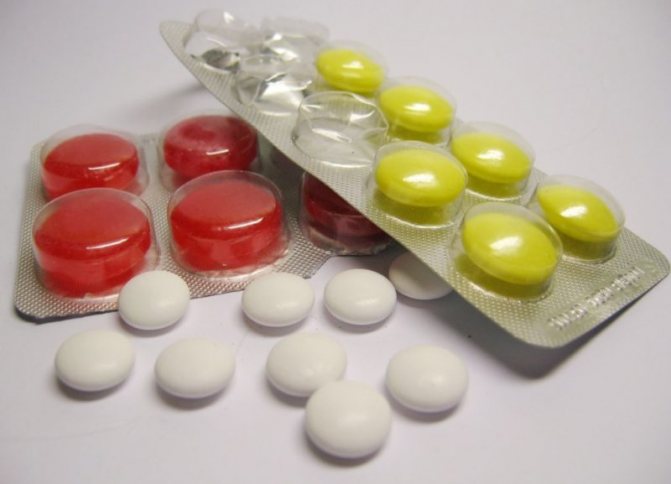
Below are various medications for nausea and vomiting, indications and contraindications for their use.
This drug acts on the vomiting center located in the brain. By blocking its work, it quickly and effectively eliminates vomiting and nausea. Indications for the use of Metoclopramide include:
- The need for symptomatic elimination of nausea and vomiting caused by poisoning or taking medications (for example, during chemotherapy);
- Elimination of vomiting during the postoperative period.
Cerucal is a potent drug and has an extensive list of contraindications:
- allergies or individual intolerance to the components of the drug;
- development of gastrointestinal bleeding, Mallory-Weiss syndrome;
- intestinal obstruction;
- disease of the adrenal glands, accompanied by an uncontrolled increase in blood pressure, pheochromocytoma;
- Parkinson's disease;
- all types of epilepsy;
- tendency to seizures, increased seizure activity.
Please note that Cerucal is prohibited for children under 1 year of age. Up to 12 years of age, it is used in pediatrics with caution, as it can cause seizures.
Sturgeon is a modern, potent drug whose action is aimed at eliminating vomiting and nausea. It is most widely used in oncology and is prescribed to patients undergoing chemotherapy.
For vomiting caused by poisoning, Osetron is prescribed if there are contraindications to Metoclopramide.
Contraindications for the use of Osetron include:
- period of pregnancy and breastfeeding;
- allergy to the components of the drug;
- age up to 2 years (relative contraindication; in the presence of oncological pathology in young children, preference is given to this particular medicine).
Motilium
Motilium or Domperidone is a drug used to improve intestinal motility. It accelerates the removal of toxins from the gastric cavity, thereby reducing the severity of nausea and vomiting.
Contraindications:
- allergic intolerance to the drug;
- partial or complete intestinal obstruction;
- taking Ketoconazole;
- gastrointestinal bleeding;
- perforation of a gastric or duodenal ulcer;
- Mallory-Weiss syndrome.
Antacids
Drugs in this group reduce the acidity of gastric juice. They envelop the walls of the stomach, protect and heal them. Some antacids contain analgesics, and with their help eliminate pain in the stomach.
Antacids effectively help with vomiting caused by irritation of the gastric mucosa.
Preparations:
- Almagel;
- Maalox;
- Phosphalugel.
In case of poisoning, nausea and vomiting may persist for the first two days. After this period, the symptoms begin to subside.
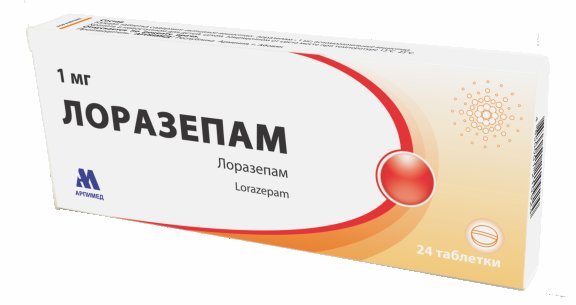
Food poisoning can cause a wide range of complications, some of which include nausea and vomiting. These include:
- Gastritis. Toxins entering the gastric cavity cause local inflammation of the gastric mucosa, which can develop into acute or chronic gastritis. If a person complains of aching and bursting pain “in the pit of the stomach”, he feels nauseous, flatulence and heartburn appear, he should seek help from a gastroenterologist. Acute gastritis may be accompanied by an increase in body temperature to 37-38 degrees;
- Pancreatitis is inflammation of the pancreas. It is this organ that first reacts to all toxins that enter our digestive system. Chronic pancreatitis often develops in children under 12 years of age. Acute inflammation of the pancreas is typical for drug and alcohol poisoning. The patient develops uncontrollable vomiting, body temperature rises above 38 degrees, dark purple bruises and subcutaneous hematomas appear on the skin near the navel;
- Acetonemic syndrome develops against the background of dehydration. Young children are more prone to this pathology. A distinctive symptom is the smell of acetone from the patient’s mouth and urine. The syndrome is accompanied by profuse vomiting, due to which the patient cannot drink on his own;
- Peptic ulcer disease can be caused by poisoning with drugs, acids, and alkalis. Manifested by nausea, vomiting, stomach pain on an empty stomach. In rare cases, it may be asymptomatic.
Diseases of the gastrointestinal tract
When diagnosing an intestinal or toxic infection, drugs that destroy the causative agents of the disease are included in the therapeutic regimen. They slow down the spread of pathology and bind toxins produced by microbes and viruses. These compounds are the main cause of nausea and vomiting. Discomfort also occurs when a bolus of food stagnates for a long time due to enzyme deficiency or poor motility of the gastrointestinal tract. The treatment of many diseases requires an integrated approach. Only a gastroenterologist should decide what to drink for nausea.

Nitrofurans
The most commonly used drugs for nausea of infectious etiology include nitrofurans. Most pathogenic bacteria and protozoa are sensitive to them. After a course of taking the drugs, all negative symptoms disappear in a person, peristalsis and digestion are normalized. The following tablets and suspensions have the greatest therapeutic effectiveness:
These medications are not antibiotics, so they do not provoke the development of dysbacteriosis. Most nitrofurans are used in the treatment of pregnant women and young children.
Antibiotics
Severe nausea is a sign of food poisoning. Along with spoiled food or contaminated water, salmonella, staphylococci, streptococci, and shigella enter the body. In this case, antibiotic therapy cannot be avoided. The results of laboratory tests have to wait several days, so gastroenterologists immediately prescribe broad-spectrum drugs:
- Ciprofloxacin (Tsifran, Tsiprolet);
- Azithromycin (Azitrox, Sumamed);
- second and third generation cephalosporins.
Daily and single dosages, as well as the duration of the course of treatment with antibacterial drugs, are determined by the doctor. As a rule, nausea and vomiting stop bothering a person after 1-2 days of taking capsules and suspensions (for children).
Antispasmodics
The cause of nausea is often cholecystitis, biliary dyskinesia and other pathologies in which the motility of the smooth muscle muscles of the gastrointestinal tract is reduced. In this state, complete digestion does not occur, peristalsis is disrupted, and dyspeptic disorders develop. Gastroenterologists prescribe to patients:
They target the source of pain and nausea a few minutes after taking the drug. Buscopan and Duspatalin do not affect the smooth muscle muscles of other internal organs, which explains the small number of their contraindications and side effects.

Domperidone
Domperidone is a universal drug for any digestive disorder. After taking the drug, the functioning of the gastrointestinal tract improves, and the negative symptoms of indigestion disappear: nausea, vomiting, increased gas formation, diarrhea or constipation. Domperidone is the active ingredient:
Manufacturers produce medicines in the form of tablets and suspensions for babies with a mint flavor. Motilium is prescribed for nausea caused by the use of various pharmacological drugs - acetylsalicylic acid, cytostatics, NSAIDs. Medicines with Domperidone eliminate the negative symptoms of rotting and fermentation processes in the stomach, which occur against the background of constant overeating or abuse of alcoholic beverages.
Eubiotics
Dysbacteriosis is characterized by excessive gas formation as a result of the death of beneficial microflora in the intestines. The lack of necessary bacteria leads to digestive problems. A person experiences painful nausea, heartburn, suffers from attacks of vomiting, seething and rumbling in the stomach. A course of probiotics and (or) prebiotics can help eliminate these problems:
- Enterola;
- Lactobacterin;
- Bifidumbacterin;
- Atcipola;
- Bififorma;
- Linexa, Linexa forte, Linexa for children.
During treatment with eubiotics, the intestines of adults and children are populated with beneficial bifidobacteria and lactobacilli. Peristalsis is gradually restored, food digestion is normalized, which helps eliminate nausea.
Advice: “After antibiotic therapy, patients often suffer from the urge to vomit due to developed dysbacteriosis. Gastroenterologists recommend taking probiotics with lactobacilli along with antimicrobial drugs to prevent increased gas formation.”
Why does nausea and vomiting begin?
There are many reasons that cause nausea and vomiting. This could be ordinary food poisoning from low-quality foods or drinking large amounts of alcohol.
For these reasons, almost everyone has experienced nausea and vomiting in their lives. Sometimes these phenomena occur because vomiting agents of plant origin act on the body, and the person begins an allergic reaction.
Specific therapy targets nausea and vomiting depending on its cause. First of all, longer-lasting vomiting must also be absolutely cleared up and treated by a doctor. Medicines for nausea and vomiting are called antiemetics. If the agents do not remain in the stomach, they can also be administered as suppositories and, if necessary, infusions.
In addition, there are herbal remedies for nausea and vomiting that contain, for example, chamomile, fennel, cumin or mint. With prolonged vomiting, it is important to compensate for the loss of fluid and mineral. If the patient immediately overheats what he previously drank, he needs fluids and electrolytes in the form of an infusion into a vein. Fennel and chamomile teas, low-carbon water, gastro ointment, and adequate rest are long-standing therapeutic measures for nausea and vomiting. Medicines for nausea and vomiting are called antiemetics.
Taking certain medications can cause the same effects. Sometimes nausea and vomiting occur after eating large amounts of fatty or fried foods.
In some people, this reaction of the body is observed due to motion sickness when moving in transport.
Pregnant women quite often suffer from toxicosis, which also results in nausea and vomiting. Sometimes this condition occurs in stressful situations, with strong feelings and worries.
However, some medications for nausea and vomiting are prescribed. These include anti-epidemic effective psychopharmaceuticals, prokinetics or serotonin antagonists. In addition, so-called neurokinin-1 receptor antagonists may prevent vomiting. They are combined with serotonin antagonists and so-called steroids. Additionally, there are herbal remedies for nausea and vomiting that contain chamomile, fennel, cumin or mint.
For nausea and vomiting, specific therapy depends on the cause. First of all, prolonged vomiting also needs to be clarified and treated by a doctor. Most infants with an acute gastrointestinal infection can be treated well at home if warning signs of dehydration are addressed early.
Sometimes nausea can occur due to injury or severe blood loss. Nausea and vomiting are uncommon when receiving a dose of radiation and developing radiation sickness.
Very often, this condition is a symptom of a certain disease of the gastrointestinal tract, central nervous system or cardiovascular system.
Children who have drowsiness or vomiting several times a day and have been affected by vomiting usually become infected with contaminated food or in other countries. Most episodes of gastrointestinal infections can be cared for in general practice and further treated at home; but there are still many hospitalizations.
The latest advice from the National Institute for Health and Clinical Excellence will help you learn how to tackle such infections to save children from hospital admission and infusions. The greatest risk of gastrointestinal infections with diarrhea and vomiting is drying out of the body, which can be a problem for young children.
When infected with the hepatitis virus, enteroviruses, staphylococci, E. coli, cholera and other bacteria or viruses, nausea and vomiting occur quite often.
Thus, this condition is a sign of the presence of a certain infection in the human body.
At the same time, nausea can be a symptom of a developing inflammatory process in the gastrointestinal tract - with gastritis, ulcers, peritonitis, appendicitis, cholecystitis, pancreatitis.
Warning signs of dehydration that require immediate hospitalization
Children at high risk of dehydration. Children under 6 months of age Children with low birth weight Children who have vomited more than five years, soft stools and more than two times within 24 hours Children who have not received or retained any additional fluid or breast milk Children with deficiencies. Changes in consciousness, dizziness, lethargy, coma, muscle spasms, trembling spasms.
Preventive and immediate measures
- In early childhood, Fontanella's general condition worsened.
- Inherited eyes.
- Heartbeat.
A saline solution can be prepared in an emergency or purchased at a pharmacy.
Sometimes, with diseases of the human cardiovascular system, such as stroke, heart attack, hypertensive crisis, the patient begins to feel sick.
Sometimes such symptoms occur in people with disorders of the endocrine system, thyroid gland, metabolism in the body, or inner ear.
In addition, nausea and vomiting can occur with intestinal obstruction due to tumors or Crohn's disease.
For 1 liter of boiled drinking water. Use this solution as a spoon. If baby refuses saline solution, try breastfeeding or other milk conservation or water only: no pure fruit, no mineral water, no cola, no soda. Caution: Without regular fluid intake the child will dry out quickly, should be instructed in a hospital where intravenous rehydration solutions are given.
Drug treatment
Cures vomiting and improves general condition, which can be returned to normal milk or food. Additionally, the above-mentioned drinks should be avoided. In most cases, antibiotic therapy is not required unless there is suspicion of sepsis, extra-gastrointestinal spread of bacteria in infants under six months of age, deficiency, poor immune status, infections with Salmonella or other specific bacteria.
It is extremely rare for foreign bodies to enter the organs of the digestive system, which can also provoke attacks.
There are many causes of nausea and vomiting, and not all diseases require taking some kind of antiemetic drug.
Caregiver Instructions for Safe Treatment at Home
Experts do not make any specific recommendations for other drugs, such as antiemetics or probiotics in young children, because the scientific basis is still lacking.
Warning symptoms of dehydration should be observed. Knowledge of oral anti-drying treatment must be present. Seek medical attention immediately if symptoms of dehydration occur. The illness may last five to seven days, and vomiting should stop after two days. In some cases, the body needs to get rid of harmful substances, and then it is not recommended to block the vomiting center with any means, but it is advised to rinse the stomach with as much liquid as possible.
Pregnancy
Typically, a discomforting sensation disturbs a woman in the first trimester of pregnancy. If nausea is short-lived and does not occur too often, then gynecologists prefer not to prescribe pills to patients. They recommend that a woman get more rest and use sour or mint candies as a preventative measure. But severe nausea that turns into bouts of vomiting cannot be avoided without taking pharmacological medications. These include:
- Kokkulin. Homeopathic remedy, the active substance of which is able to prevent and eliminate nausea, increased salivation, dizziness;
- Bonin. The drug combines antiemetic, antihistamine and sedative effects. A single dose allows you to get rid of discomfort for 24 hours;
- Hofitol. The drug is used in the treatment of dyspeptic disorders, manifested by nausea, bloating, heartburn, and a feeling of heaviness in the epigastric region. Hofitol contains extract from artichoke leaves;
- Splenin. A preparation made from bovine spleen extract improves the functioning of the gastrointestinal tract. Splenin is used for the treatment and prevention of nausea in the first trimester of pregnancy.
While carrying a child, it is not advisable to use infusions and decoctions from herbal raw materials that reduce the severity of nausea. Herbal medicines can provoke the development of allergic reactions, which are extremely undesirable during pregnancy.
Detoxification agents
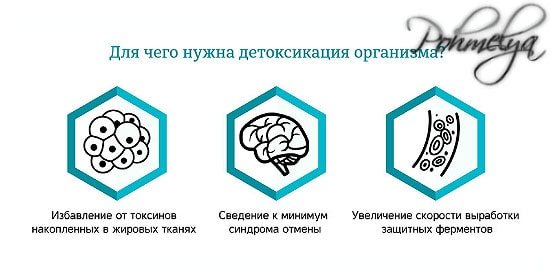
Detoxification drugs prevent the negative effects of ethanol on the body and promote the rapid elimination of its breakdown products. Such products cleanse the liver and have a diuretic effect. They can be produced in the form of tablets or solutions.
Reamberin is available as a liquid for infusion. The active substance in the medication is succinic acid. It activates energy processes in the body. Restores electrolyte balance. Sodium thiosulfate has a similar effect. It is also available as a solution for infusion.
Previously, Hemodez was used as a detoxification agent. But modern medicine today gives preference to Reambirin. The drug can be used even in severe cases of alcohol poisoning. The active substance of the drug includes the natural protective functions of the body.
In case of severe intoxication, dropper solutions are used.
This is necessary in advanced stages of alcoholism, when other forms of drugs no longer help. They eliminate acetaldehyde in blood fluid. Such medications reduce the negative effects of ethanol on the brain and heart. Solutions for droppers include Riboxin, Reopoliglucin, Reosorbilact.
Motion sickness in transport
People often avoid long trips in public transport due to a weak vestibular system. Even slight swaying causes nausea, dizziness and a drop in blood pressure. Not only adults, but also young children suffer from negative symptoms. To quickly adapt to means of transportation, many drugs for nausea and vomiting have been synthesized:
- Aeron. A combined drug containing scopolamine and hyoscyamine prevents the effect of acetylcholine on M-cholinergic receptors. The result is a decrease in the tone of the smooth muscle muscles of the gastrointestinal tract;
- Dramamine. The drug is able to affect the human vestibular system, relieves dizziness, nausea and vomiting. Dramamine tablets must be taken an hour before traveling on any type of transport;
- Air-sea. A multicomponent homeopathic drug quickly and effectively reduces the severity of autonomic and vestibular disorders. Used before traveling in transport, increases resistance to motion sickness, characteristic of driving in vehicles;
The most popular homeopathic medicine for nausea is Vertigohel. The drug has a stimulating effect on the central nervous system. Its natural ingredients harmoniously complement each other, which enhances the therapeutic effect.
Recommendation: “Vertigohel can be used to prevent nausea when traveling long distances, since even with frequent use it does not have side effects.”
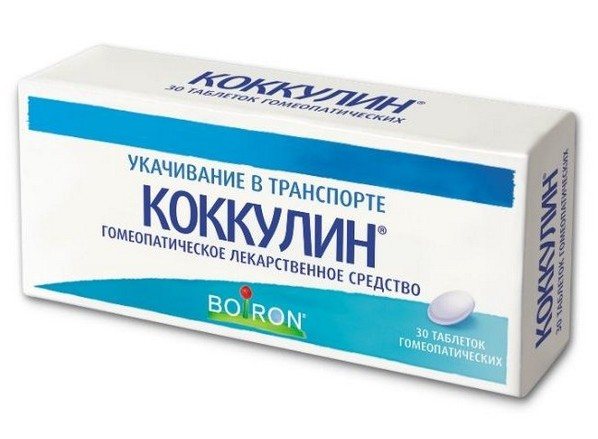
M-cholinergic receptor blockers
Medicines in this group affect the parasympathetic part of the nervous system. They reduce the production of secretions from the digestive glands, and also weaken the tone of the smooth muscles of the gastrointestinal tract.
This remedy for nausea and vomiting reduces the secretion of glands of the digestive tract and has an antispasmodic effect on the smooth muscles of the gastrointestinal tract and genitourinary system. It is indicated for:
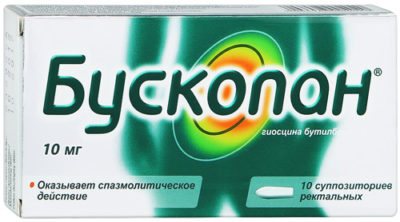
- spasms of the gastrointestinal tract and genitourinary tract, including biliary and intestinal colic, pyloric spasm;
- exacerbation of peptic ulcer of the duodenum and stomach;
- spastic biliary dyskinesia.
An inexpensive anti-vomiting medication is available in the form of tablets and rectal suppositories. It can be used to treat children over 6 years of age and women during pregnancy and lactation, but in the early stages of gestation a doctor’s consultation is required. Standard dosage is 1–2 tablets/suppositories per day.
The drug is not prescribed for glaucoma, myasthenia and megacolon. It is better to replace it with an analogue.
The therapeutic effect of the drug includes:
- elimination and prevention of spasm of smooth muscles of the stomach, intestines, gallbladder and bile ducts;
- weakening of peristalsis;
- decreased activity of pancreatic secretion, hydrochloric acid and pepsin.
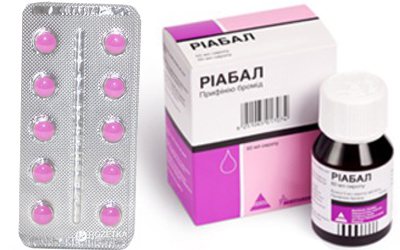
Riabal is prescribed for nausea and vomiting, cramping abdominal pain and bloating. The list of contraindications includes prostate adenoma, glaucoma, chronic heart failure, coronary heart disease and a number of other diseases. Used to treat newborns (in the form of syrup), children over 6 years of age (tablets) and adults. Pregnancy and breastfeeding are not included in the list of contraindications.
Adults and adolescents over 12 years of age are prescribed 30–60 mg of anti-vomiting medication three times a day. For children under this age, the dosage is calculated taking into account weight, age and dosage form used.
Malignant neoplasms
When diagnosing malignant neoplasms, a person often suffers from nausea and vomiting. The reason for this is not only endotoxins, but also chemotherapy or radiation therapy. With such diseases, the patient’s physical and psychological condition deteriorates, so symptomatic therapy is important. To eliminate the discomfort, oncologists practice prescribing the following tablets for vomiting and nausea:
- Ondansetron in rectal suppositories;
- Zofran and Granisetron in injection solutions;
- Trifluoperazine, Haloperidol in tablets or solutions for parenteral administration;
- Diazepam, Lorazepam tablets;
- Buscopan in rectal suppositories.
The use of benzodiazepines allows you to get rid of not only nausea, but also fear and anxiety about your future. Buscopan improves peristalsis, normalizes digestion, and eliminates excess gas formation.
Video about antiemetics
Bifidumbacterin
A medicinal product containing live bifidobacteria. The drug normalizes the intestinal microflora, eliminates bloating, spasms, nausea and vomiting caused by dysbacteriosis.
The powder is taken orally in 3 doses 3 times a day, the duration of treatment is 7-10 days. Capsules are prescribed for a course of 10 days; you should take 1 capsule 3 times a day. The only contraindication for use is an allergy to the components of the composition.
Domegan
A medicine against vomiting and nausea containing ondansetron as an active ingredient. It has a pronounced effect and helps to quickly eliminate symptoms.
The solution is administered intravenously and intramuscularly, 2 or 4 ml 2 times a day, depending on the severity of the manifestations. The medicine is used in a hospital setting for nausea and vomiting of various origins. The maximum duration of the course is 7 days.
An absolute contraindication for use is considered to be an allergy to the components of the composition, lactation and the 1st trimester of pregnancy. Do not use it for children under 3 years of age.
The safest remedy against nausea and vomiting, which contains mint extract. Used for children and adults.
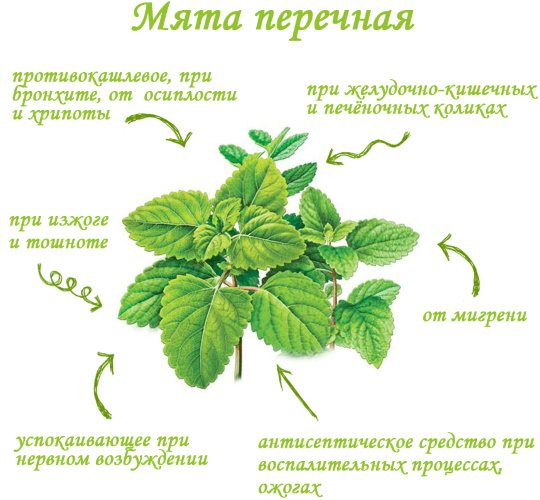
The menthol in mint is considered a strong antiemetic for adults
The medicine must be taken orally, 10 drops 3 times a day for a week. The medicine is contraindicated during pregnancy and lactation, under the age of 12 years, and if you are allergic to the components of the composition.
Antiemetic medications help alleviate the condition of patients with various diseases and conditions. The remedy for adults is selected taking into account the symptoms and the cause of their occurrence. In each case, the regimen, course duration and dosage may differ.
Article design: Vladimir the Great


